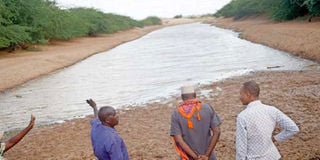Inside the Sh7 billion irrigation project that amounted to nothing

Farmers point at the stalled Bura Irrigation Scheme that was to serve more than 2,000 farmers by replacing diesel-powered engine pumps with a gravity system in this picture taken on May 19, 2019. PHOTO | LABAN WALLOGA | NATION MEDIA GROUP
What you need to know:
- Through competitive bidding, NIB awarded the contract to IVRCL Infrastructure Limited, a renowned Indian infrastructure company undertaking water projects, after receiving a clean bill of health from the financiers.
- The NIB management estimates it at 20 per cent complete. At the site, bulldozers, excavators and lorries, which have not been used for years, are rusting, with the locals saying they were last used more than two years ago.
- In November last year, the government and its development partners released Sh1.3 billion to restart the project, but nothing has been done so far.
Kenya could lose more than Sh7.35 billion in a project that sought to replace diesel-powered engine pumps with a gravity system, which could have cut down operational costs and increased the acreage under irrigation within the Bura Irrigation and Settlement Scheme in Tana River County.
RUSTING BULLDOZERS
The project, which was launched six years ago, has not taken shape despite the government investing heavily in it.
When the Sunday Nation visited the area, our team was trailed by people who documented every detail of what we were recording.
The National Irrigation Board (NIB) Bura manager Felix Shiundu changed his mind about meeting us at the last minute despite our appointment with him.
In 2008, the government signed a loan agreement with Kuwait, the Arab Bank for Economic Development in Africa (BADEA) and the OPEC Fund for International Development (OFID) for the rehabilitation project that included developing infrastructure for gravity water diversion and the rehabilitation of the existing ones.
Sabbuor Associates was selected alongside CAS and AL Dowailah Consultants the same year to carry out detailed designs of the project within nine months, followed by the supervision of the construction phase after the selection of a contractor.
Through competitive bidding, NIB awarded the contract to IVRCL Infrastructure Limited, a renowned Indian infrastructure company undertaking water projects, after receiving a clean bill of health from the financiers.
Since the contract was awarded in February 2013, very little has been done. The NIB management estimates it at 20 per cent complete. At the site, bulldozers, excavators and lorries, which have not been used for years, are rusting, with the locals saying they were last used more than two years ago.
FUNDING WITHDRAWN
The multibillion-shilling project, touted as a solution to the high cost of irrigation within the Bura Irrigation Scheme, was expected to be completed by September 2015.
According to a statement by NIB, the project had stalled due to lack of funding.
“… The project construction commenced on May 27, 2013. However, its scheduled completion has been affected by low funding. The contractor has requested for extension by an additional 12 months to the completion date of March 30, 2019, and the concurrence of the donor is being sought. More efforts are being put in place to secure financing to meet the cost of completing the project as designed,” stated part of the report by NIB at the end of last year.
In November last year, the government and its development partners released Sh1.3 billion to restart the project, but nothing has been done so far.
The project that was to take 30 calendar months from February 27, 2013 has now taken six years, having received several extensions ever since, until the funding was withdrawn.
NIB principal engineer Alexander Kuria earlier said the scheme currently abstracts irrigation water from the river using diesel-fuelled generators and pump sets with a discharge capacity of 2.7 cubic metres per second.
Mr Kuria said once the irrigation water is lifted from the river, it flows by gravity through the distribution system to the farms.
“The project aims at enhancing national food security through the installation of a gravity water abstraction system to lower the cost of production and increase the area under irrigation in Bura Irrigation Scheme to 15,000 acres from 6,000 acres,” said Mr Kuria.
INSOLVENCY PROCEEDINGS
The project comprises construction of an upstream intake on river Tana, conveyance canals and the rehabilitation of existing structures, diversion facilities at Korakora site, river bank protection works, sedimentation basin, and connecting the canal with a discharge capacity of 11 cubic metres per second.
They also include the rehabilitation of the main and secondary canal, irrigation and drainage infrastructure as well as the lining of the new canal (26 kilometres) and existing main canal (6km) to minimise water losses through seepage.
The use of diesel pumps has been a major limitation in the sustainability and further expansion of the scheme due to high maintenance costs.
“The project is necessary to lower the cost of production by eliminating pumping, which consumes up to Sh5 million monthly,” said Mr Kuria.
The engineer said the contract for the project between NIB and the contractor, IVRCL Ltd of India, had been terminated due to commencement of insolvency proceedings against IVRCL Ltd in India as per the relevant clauses of the agreement.
Mr Kuria said NIB was in the process of engaging a new contractor to take over the project.






